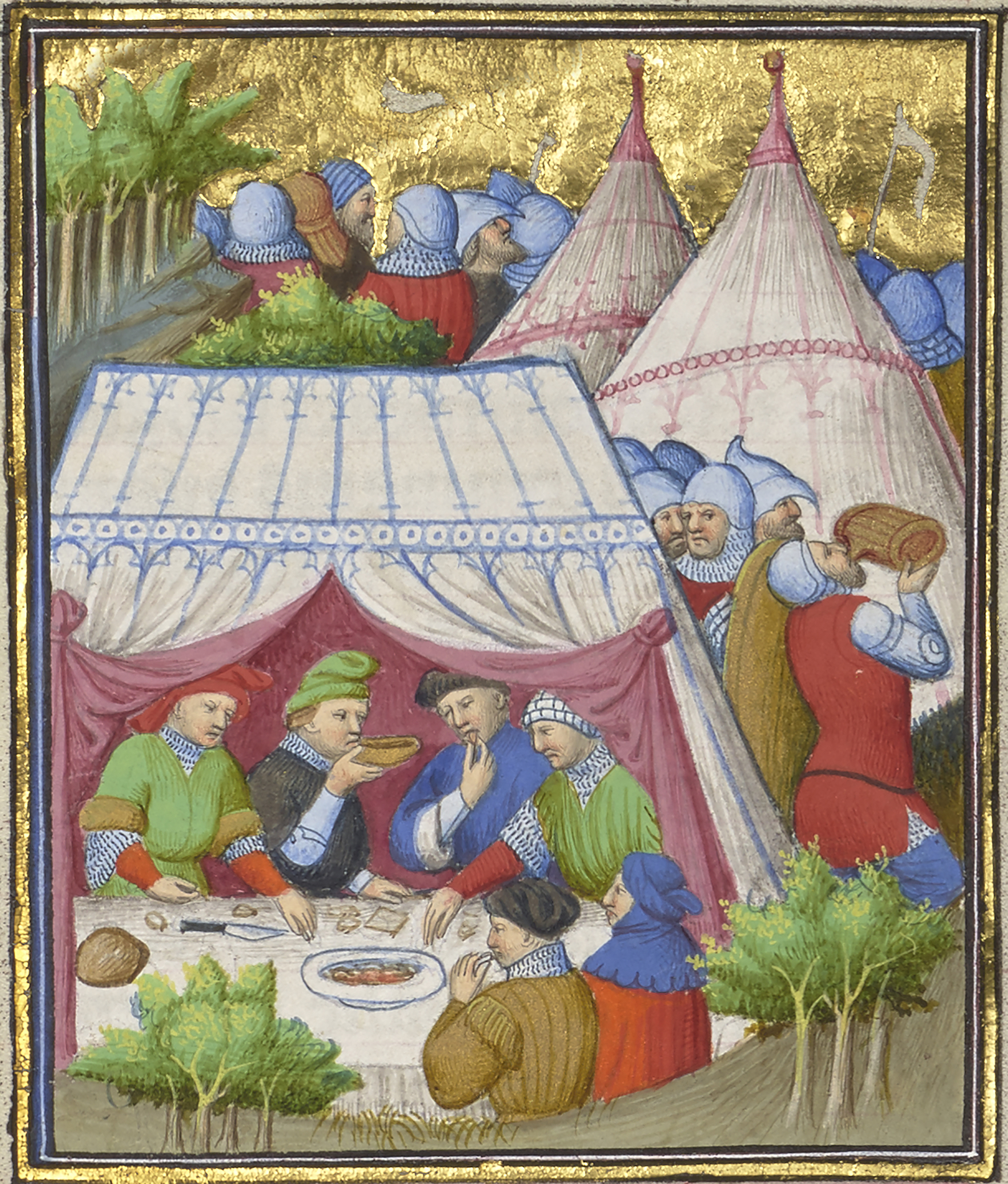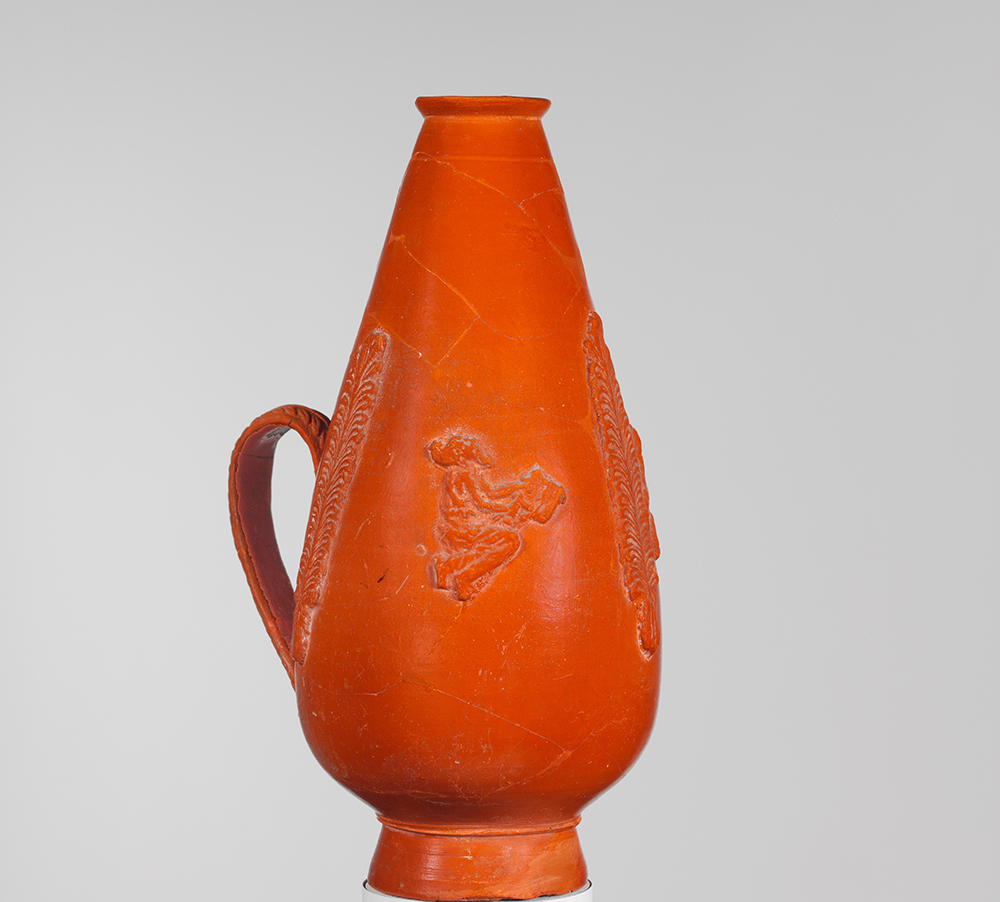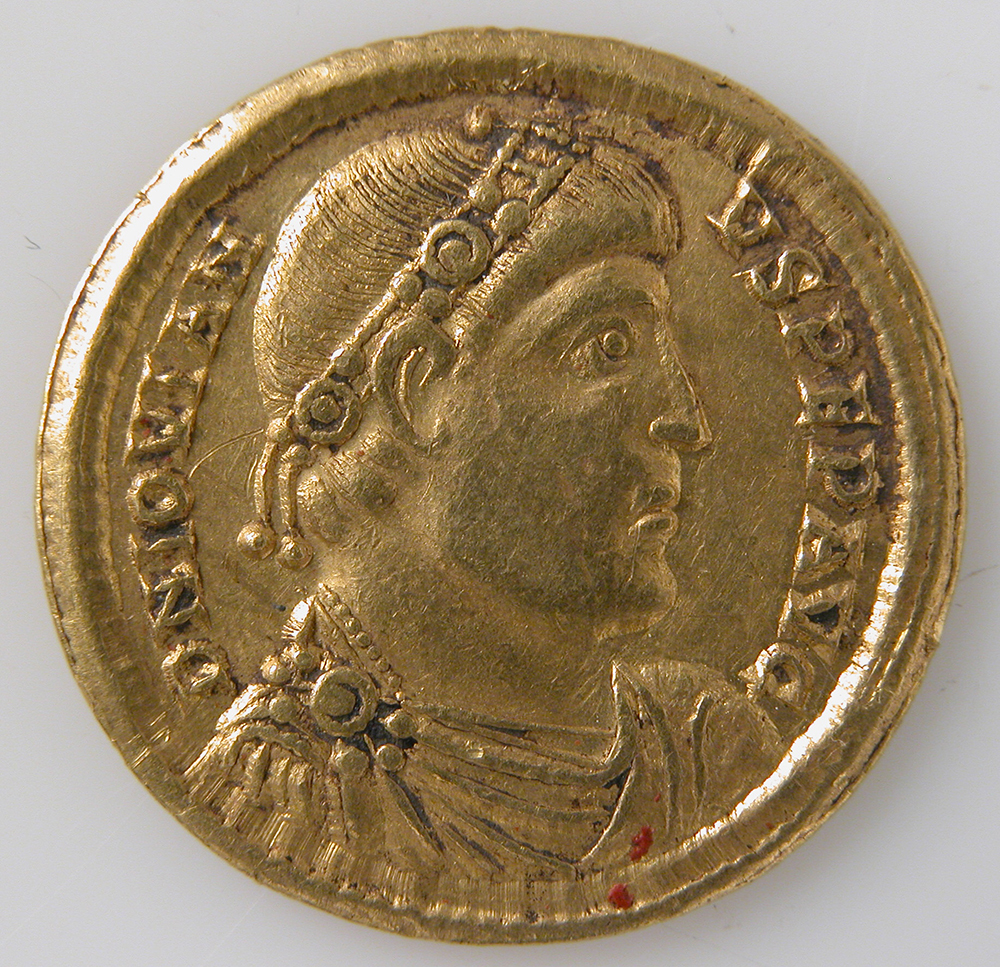
The Romans Feast in an Encampment While the Goths Starve, by Boucicaut Master or workshop, c. 1414. © The J. Paul Getty Museum, Los Angeles. Digital image courtesy the Getty’s Open Content Program.
There were many reasons why citizens and immigrants from the borderlands decided to join the Roman army. Some did so for the basest reasons, out of necessity, as was the case for many economically hard-pressed communities who lived at the Danube. In good times, a provincial citizen or a Goth could earn a lucrative career by buying or selling amber, furs, and hides at the many Roman trading towns stationed above the riverbanks, like the imposing fortress at Noviodunum, whose tall stone walls loomed over the hills. Soldiers surveilled the river border from its high watchtowers. A naval base was nestled beneath its escarpment. Wealthier provincials often avoided military service by opting to work in one of the town’s essential trades.
By the late fourth century, a chain of forts like the one at Noviodunum extended along the Danube—at places like Capidava, Sucidava, Cii, and Bireo, all of them located in modern Romania. The cargo provisioned Rome’s soldiers on the frontier with their needed bread, oil, and wine and fed the engine of the local economy. But the situation did not last.
Rome was still an empire of immigrants in those years. Many immigrants advanced their families’ reputations and their own careers by settling inside the Roman Empire’s borders: Franks, Armenians, Vandals, Moors, Ethiopians, and more. Unless conquered and enslaved in war, every man and woman who lived inside the empire’s territorial border held the status of a free person. A kaleidoscope of options for where to live, what to enjoy, and how to earn a living kept society colorfully in motion. Latin may have famously been the common language, but all around the ancient world, multilingualism was the norm. A basic definition of Romanitas—the quality of what it meant to live under the rule of the emperors, to call one of the hundred-plus provinces your home, and to know that the borders of your world were protected day and night by soldiers at the frontier—emerged from this array of diversity. Privilege, education, wealth, and one’s own dreams filled in the rest.
Nevertheless, an unavoidable level of precariousness had always defined the immigrant experience in Rome. Both before and after Caracalla’s citizenship law—which in 212 gave all free men in the empire Roman citizenship—immigrants, refugees, and exiles faced an uncertain reception wherever they went. Plutarch, a widely traveled Greek speaker who had a sympathetic ability to see both the fascinating and the frightening in people’s lives, captured some of their challenges in his biographies and essays. He is best known for his Lives, a series of biographical portraits of ancient statesmen that paired Greek figures with Roman ones to draw out parallel lessons. But at the end of the first century, he also wrote an essay, “On Exile,” that explored the predicament of finding oneself in new surroundings.
Being forced to leave one’s home is an ordeal no one should be forced to endure, Plutarch began. Geographical dislocation causes undeniable suffering. Everyone admires how the ancient bards channeled that emotion into their soulful poetry and music, he acknowledged. But, he went on, fortunately hardships are never immutable, and one’s circumstances can often improve. In the same way a good cook can recognize when a dash of “sweet and pleasant” spice might help mask the “disagreeable” flavor of a “bitter and pungent” dish, a readiness to experiment and a willingness to be creative constitute one’s basic recipe for survival in a strange land. The culinary comparison was especially apt for Plutarch’s audience, since it was food, after all, that taught many isolated Romans about cultures beyond their borders.
Plutarch’s essay preached a civic gospel—of hard work and optimism—that nudged many Roman readers to sympathize with the alieni (to use the Latin term for “strangers”) they encountered. The examples Plutarch chose to illustrate the pain of displacement told a powerful story about the need for perseverance and acceptance. Hadn’t the city of Athens at one time banished the mythical hero Theseus from its community? Now the Athenians worshipped him as a founding father. And hadn’t a migrant from Thrace started the Eleusinian Mysteries, which expanded to become one of the ancient world’s longest-running religious festivals, at Eleusis? The lesson was that human beings were eminently adaptable—“No place can take away happiness”—but only if citizens and “aliens” worked together.
“Do you see the boundless ether overhead? / That holds the earth within its soft embrace?” Plutarch asked, quoting for his readers a now-lost Greek play. “This is the boundary of our native land, and here no one is either exile or foreigner or alien.” Any small-minded provincial foolish enough to claim that the moon looked better at Athens than at Corinth, he asserted, deserved to be ridiculed. In Plutarch’s mind, the wonders of the world knew no geographical boundary—a message that was undoubtedly easy for him to preach as a native Greek speaker, a friend of the emperors, and a Roman citizen.
Two hundred years later, even with its flaws—a legacy of colonialism, an aggressive foreign policy, unchecked rancor toward foreigners in its own cities—an immigrant could settle down in the Roman Empire, learn a trade, raise a family, and make a decent living. A simple plot of land might be sufficient. Opportunity plus patience equaled happiness. By the Middle Ages, that formula became proverbial. “Rome wasn’t built in a day,” people quipped.

Ambitious foreigners, both men and women, sensed the possibilities. Despite the limitations of not being a citizen, an immigrant to the fourth-century empire could legally go anywhere, work any craft, and be anything. Each of Rome’s territories had its own unique allure, from its climate to its food to the careers its people pursued. Simple, ordinary friction—between a region’s local customs and the broader trends whirling around the Mediterranean Sea—propelled the Roman Empire in interesting directions. Intellectuals went east to the distinguished centers of learning at Athens, Antioch, and Alexandria, where they conducted their highbrow conversations in the taverns run by sons of local farmers. By the fourth century, businessmen had struck it rich on the North African coast by investing in kilns, digging and processing local clays, and manufacturing heavy-duty ceramic containers for wine and olive oil to be shipped throughout the Mediterranean. Gradually expanding their production into a popular line of home goods that included cups, cookware, and plates—a style archaeologists call African red slip ware because of its glossy orange color—these entrepreneurs soon dominated the Roman market.
As the Danube trading centers went quiet and local pottery production shut down, the Roman military became the most prominent industry at the northern border by the end of the fourth century. Both Goths and Romans enlisted.
A soldier’s life brought tangible benefits not exclusively reserved for Roman citizens. A soldier’s pay—what Romans called a stipendium—was on the whole a good living wage, with ample spending money. Enlistees received provisions and a small bonus every five years, through the emperor’s generosity. It cost the government twenty-five or thirty solidi a year to fully fund a soldier, including housing, food, weapons, and uniform. It is impossible to determine a modern equivalent in today’s currency, but even if a recruit never saw most of those gold coins (which chiefly covered his overhead), that amount of money could, in theory, go far.

Roman law explicitly granted these men many legal protections when they retired, including farm equipment, arable land, tax exemptions, and health benefits. An imperial law signed in the early fourth century extended to members of the Danube River patrol “the same privilege [as the cavalry and infantry] without distinction if they should prove that they have been discharged because of wounds received in action.” Both foreign and citizen soldiers were given valuable start-up grants of oxen and assorted grains, which sensible legislators apportioned so that veterans could start their own farms. The farmland itself was awarded to them tax-free, and laws permitted an additional personal exemption for service members’ fathers and mothers “if they should have these kinsmen surviving.” For the soldiers, many of them the heads of Gothic families, a lighter financial burden brought more economic security to their household at the end of the year. All retired military personnel received these same government benefits, whether they had been born outside the borders or were Roman citizens.
Among the many benefits Rome’s army bestowed on its recruits, however, a well-rounded, almost humanistic education was among the most valuable. Commanders gave their soldiers both formal and informal lessons in geography, math, engineering, collaboration, problem solving, and new languages—a suite of essential skills for anyone wishing to make a future in the rapidly changing world. Years of living with officers and drinking in highway inns also gave the more economically disenfranchised something they had likely never dreamed of gaining: a passable knowledge of Latin.
The need for Latin, if not Greek, was obvious to many discerning foreigners, who could see that a lack of either language might be used to keep them out of Roman society. The Roman people had long been raised to see the two classical languages as hallmarks of culture, an expression of one’s credentials, and keys to advancement. Parents believed that their sons’ and daughters’ futures depended on acquiring a proficiency in one tongue and at least working knowledge of the other language. They imparted this value to their children starting at an early age, and the precocious ones excelled at both, like the eleven-year-old Roman boy named Quintus Sulpicius Maximus, who won a language contest for his ability to speak in Greek. Pretending to be Zeus, he extemporized a poem in which he took on the persona of the king of Olympus reacting to the news that the Sun had foolishly lent his chariot to a mortal, who’d crashed it. With its astute, mature reflections on the nature of responsibility, Quintus’s performance astonished his mother and father, no less so because their boy delivered it in a second language. When he died—at eleven years, five months, and twelve days—his parents paid to have the entire text of the prize-winning composition chiseled on their son’s tombstone. They erected it at a highly visible place in Rome on the old Salt Road, outside the Salt Gate.
For immigrants, an unwritten rule of cultural assimilation would prove an especially cruel trap. While it was true that immigrants could always settle down wherever they wished, and that the Roman government never closed its borders—not even after the spike in immigrants during the Danube crisis of the 370s—one’s physical characteristics dictated whether one was perceived as a Roman. After Caracalla’s law, to be treated with dignity in the later empire always depended on how one dressed, how one spoke, and how one behaved. The acceptance of immigrants was based on a self-righteous sense of Roman cultural superiority. Basic rights were never guaranteed, for apart from its volumes of laws and the emperor’s occasional declarations, the ancient Romans lacked any formal, drafted constitution. If the lowliest Roman citizen disapproved of how a foreigner looked, sounded, or acted, there was no recourse from discrimination.
Foreigners were at the mercy of these racial and ethnic structural biases and suffered disproportionately for them; even soldiers felt slighted in their day-to-day routines. Toward the end of the 380s, a xenophobic incident rocked the world of Roman sports and led to one of the most notorious public scandals. At the majestic imperial city of Thessaloniki, whose pleasant seaside location had made it a favorite residence for fourth-century emperors, an immigrant police officer named Butheric arrested a local star athlete—a popular chariot driver, never named in any of the accounts—and jailed him for making improper advances “on a barman’s honor.”
The streets of the usually reserved imperial city, where diplomats strolled with their entourages and government workers congratulated one another on the signing of foreign treaties, erupted in violence as the fans expressed their fury at what they deemed to be the unjust arrest of their favorite athlete. Games and races were postponed while the accused immigrant officer, Butheric, was held, awaiting trial. The legal justification for making the arrest was never clearly established, and Butheric was eventually killed by a mob before his case could proceed before a judge. In an iron-fisted demonstration of his authority, the Roman emperor Theodosius rounded up the mob—seven thousand unruly citizens, one ancient writer claims—and executed them for contravening Roman justice. Yet many foreigners continued to immigrate to Rome to start their new lives, undeterred by the horror of Butheric’s public murder.
Excerpted from Alaric the Goth: An Outsider’s History of the Fall of Rome by Douglas Boin. Copyright © 2020 by Douglas Boin. Used with permission of the publisher, W.W. Norton & Company, Inc. All rights reserved.
